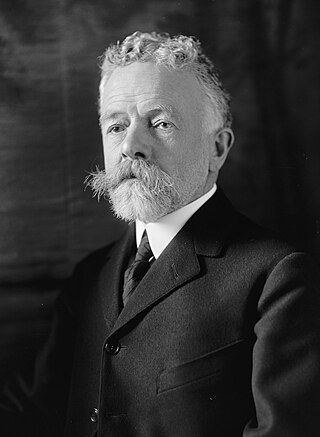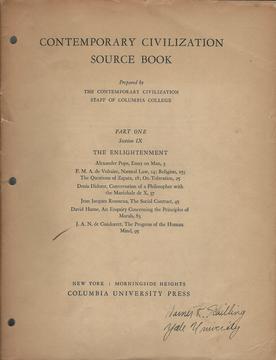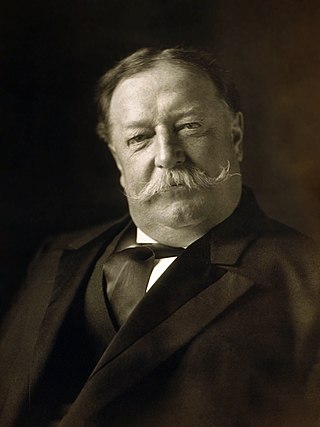
Theodore Roosevelt Jr., also known as Teddy or T. R., was the 26th president of the United States, serving from 1901 to 1909. Roosevelt previously was involved in New York politics, including serving as the state's 33rd governor for two years. He served as the 25th vice president under President William McKinley for six months in 1901, assuming the presidency after McKinley's assassination. As president, Roosevelt emerged as a leader of the Republican Party and became a driving force for anti-trust and Progressive policies.

Big stick ideology, big stick diplomacy, big stick philosophy, or big stick policy was a political approach used by the 26th president of the United States, Theodore Roosevelt. The terms are derived from an aphorism which Roosevelt often said: "speak softly and carry a big stick; you will go far". The American press during his time, as well as many modern historians today, used the term "big stick" to describe the foreign policy positions during his administration. Roosevelt described his style of foreign policy as "the exercise of intelligent forethought and of decisive action sufficiently far in advance of any likely crisis". As practiced by Roosevelt, big stick diplomacy had five components. First, it was essential to possess serious military capability that would force the adversary to pay close attention. At the time that meant a world-class navy; Roosevelt never had a large army at his disposal. The other qualities were to act justly toward other nations, never to bluff, to strike only when prepared to strike hard, and to be willing to allow the adversary to save face in defeat.

Henry Cabot Lodge was an American politician, historian, lawyer, and statesman from Massachusetts. A member of the Republican Party, he served in the United States Senate from 1893 to 1924 and is best known for his positions on foreign policy. His successful crusade against Woodrow Wilson's Treaty of Versailles ensured that the United States never joined the League of Nations and his penned conditions against that treaty, known collectively as the Lodge reservations, influenced the structure of the modern United Nations.

In the history of United States foreign policy, the Roosevelt Corollary was an addition to the Monroe Doctrine articulated by President Theodore Roosevelt in his 1904 State of the Union Address, largely as a consequence of the Venezuelan crisis of 1902–1903. The corollary states that the United States could intervene in the internal affairs of Latin American countries if they committed flagrant wrongdoings that "loosened the ties of civilized society".
A United States presidential doctrine comprises the key goals, attitudes, or stances for United States foreign affairs outlined by a president. Most presidential doctrines are related to the Cold War. Though many U.S. presidents had themes related to their handling of foreign policy, the term doctrine generally applies to presidents such as James Monroe, Harry S. Truman, Richard Nixon, Jimmy Carter, and Ronald Reagan, all of whom had doctrines which more completely characterized their foreign policy.

William Franklin Knox was an American politician, soldier, newspaper editor, and publisher. He was the Republican vice presidential candidate in 1936 and Secretary of the Navy under Franklin D. Roosevelt during most of World War II.

Theodore Roosevelt V, also called Theodore IV, is an American investment banker and managing director at Barclays Investment Bank. He is a member of the Council on Foreign Relations, the Economic Club of New York, and the Foreign Policy Association, and serves on the Advisory Council of Represent.Us, a nonpartisan anti-corruption organization. Roosevelt is also a prominent conservationist. His name suffix varies since his great-grandfather, President Theodore Roosevelt, was a son of Theodore Roosevelt Sr., though the same-named son did not commonly use a "Jr." name suffix.

The Core Curriculum was originally developed as the main curriculum used by Columbia College of Columbia University in 1919. Created in the wake of World War I, it became the framework for many similar educational models throughout the United States, and has played an influential role in the incorporation of the concept of Western civilization into the American college curriculum. Today, customized versions of the Core Curriculum are also completed by students in the School of Engineering and Applied Science and the School of General Studies, the other two undergraduate colleges of Columbia University.
Dickinson State University (DSU) is a public university in Dickinson, North Dakota. It is part of the North Dakota University System. It was founded in 1918 as Dickinson State Normal School and granted full university status in 1987.

The presidency of Theodore Roosevelt started on September 14, 1901, when Theodore Roosevelt became the 26th president of the United States upon the assassination of President William McKinley, and ended on March 4, 1909. Roosevelt had been the vice president for only 194 days when he succeeded to the presidency. A Republican, he ran for and won by a landslide a four-year term in 1904. He was succeeded by his protégé and chosen successor, William Howard Taft.

The Progressive Party, popularly nicknamed the Bull Moose Party, was a third party in the United States formed in 1912 by former president Theodore Roosevelt after he lost the presidential nomination of the Republican Party to his former protégé turned rival, incumbent president William Howard Taft. The new party was known for taking advanced positions on progressive reforms and attracting leading national reformers. The party was also ideologically deeply connected with America's radical-liberal tradition. After the party's defeat in the 1912 United States presidential election, it went into rapid decline in elections until 1918, disappearing by 1920. The "Bull Moose" nickname originated when Roosevelt boasted that he felt "strong as a bull moose" after losing the Republican nomination in June 1912 at the Chicago convention.
Susan Roosevelt Weld is an American educator who is a former professor at Harvard specializing in ancient Chinese civilization and law. She also was General Counsel to the Congressional-Executive Commission on China. She was the First Lady of Massachusetts from 1991 until 1997.

The presidency of William Howard Taft began on March 4, 1909, when William Howard Taft was inaugurated as 27th president of the United States, and ended on March 4, 1913. Taft was a Republican from Ohio. The protégé and chosen successor of President Theodore Roosevelt, he took office after easily defeating Democrat William Jennings Bryan in the 1908 presidential election. His presidency ended with his landslide defeat in the 1912 election by Democrat Woodrow Wilson, after one term in office.
Theodore Roosevelt (1858–1919) served as the president of the United States (1901–1909). He also served as the vice president of the United States (1901) and governor of New York (1889–1900). He was defeated in the 1912 United States presidential election. He was a leading spokesman for progressivism after 1890. By 1907 he was denouncing "Malefactors of Great Wealth" and attacking the courts as too beholden to business. He split with his chosen presidential successor William Howard Taft and in 1912 tried and failed to stop the conservative Republicans from renominating Taft and taking control of the party. Instead he created a new party with a platform that presaged the liberalism of the New Deal Democrats of the 1930s. In terms of foreign policy, however, Roosevelt appealed to conservatives by promoting nationalism, imperialism, using force to obtain control of the Panama Canal, and building a powerful world-class navy.
John Milton Cooper Jr. is an American historian, author, and educator. He specializes in late 19th and early 20th-century American political and diplomatic history with a particular focus on presidential history. His 2009 biography of Woodrow Wilson was a finalist for the Pulitzer Prize, and biographer Patricia O'Toole has called him "the world's greatest authority on Woodrow Wilson." Cooper is Professor Emeritus at the University of Wisconsin-Madison.
Howard Kennedy Beale was an American historian. He had several temporary appointments before becoming a professor of history at the University of North Carolina in 1935. His most famous student was C. Vann Woodward, who adopted the Beard-Beale approach to Reconstruction. He went to the University of Wisconsin in 1948, where he directed many dissertations. He specialized in nineteenth and twentieth-century American history, particularly the Reconstruction era, and the foreign policy of the early 20th century. He was a noted civil libertarian and advocate for academic freedom.
The 1901 State of the Union Address was given on Tuesday, December 3, 1901, by the 26th president of the United States, Theodore Roosevelt. It was presented to both houses of the 57th United States Congress, but he was not present. He stated, "The Congress assembles this year under the shadow of a great calamity. On the sixth of September, President McKinley was shot by an anarchist while attending the Pan-American Exposition at Buffalo, and died in that city on the fourteenth of that month." He concluded it with, "Indeed, from every quarter of the civilized world we received, at the time of the President's death, assurances of such grief and regard as to touch the hearts of our people. In the midst of our affliction we reverently thank the Almighty that we are at peace with the nations of mankind; and we firmly intend that our policy shall be such as to continue unbroken these international relations of mutual respect and good will."
This bibliography of Theodore Roosevelt is a list of published works about Theodore Roosevelt, the 26th president of the United States. The titles are selected from tens of thousands of publications about him.

The history of U.S. foreign policy from 1897 to 1913 concerns the foreign policy of the United States during the Presidency of William McKinley, Presidency of Theodore Roosevelt, and Presidency of William Howard Taft. This period followed History of U.S. foreign policy, 1861–1897 and began with the inauguration of McKinley in 1897. It ends with Woodrow Wilson in 1913, and the 1914 outbreak of World War I, which marked the start of new era in U.S. foreign policy.

The foreign policy of the Theodore Roosevelt administration covers American foreign policy from 1901 to 1909, with attention to the main diplomatic and military issues, as well as topics such as immigration restriction and trade policy. For the administration as a whole see Presidency of Theodore Roosevelt. In foreign policy, he focused on Central America where he began construction of the Panama Canal. He modernized the U.S. Army and expanded the Navy. He sent the Great White Fleet on a world tour to project American naval power. Roosevelt was determined to continue the expansion of U.S. influence begun under President William McKinley (1897–1901). Roosevelt presided over a rapprochement with the Great Britain. He promulgated the Roosevelt Corollary, which held that the United States would intervene in the finances of unstable Caribbean and Central American countries in order to forestall direct European intervention. Partly as a result of the Roosevelt Corollary, the United States would engage in a series of interventions in Latin America, known as the Banana Wars. After Colombia rejected a treaty granting the U.S. a lease across the isthmus of Panama, Roosevelt supported the secession of Panama. He subsequently signed a treaty with Panama which established the Panama Canal Zone. The Panama Canal was completed in 1914, greatly reducing transport time between the Atlantic Ocean and the Pacific Ocean. Roosevelt's well-publicized actions were widely applauded.









